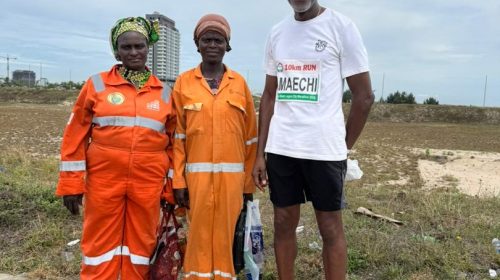Rewriting the fate of public schools in Nigeria
By Tunji Olaopa
In this piece, my objective is to celebrate the recent ascension of Dr Wale Okediran, medical doctor, public servant and writer extraordinaire, as the president of the Olivet Baptist High School (OBHS), Oyo, National Old Student Association (NOSA).
For so many of us, Olivet Heights serves as a constantly unifying juncture that molded all those who attended that educational space and whose future were somehow molded in one way or the other.
Malcolm X once wrote: “My alma mater was booked, a good library.” Olivet Heights for me is an alma mater of books. But it also an alma mater of people. And Dr Okediran is one significant member of that space and remarkable old school that brought up all of us. And this is one choice I heartily applaud.
With Dr Okediran, the national association of the OBHS has made the significant statement that the governance of old students’ association makes some fundamental addition to the understanding of the national context within which the association is situated. And this starts from the school itself that generated the association and the national space within which the association must operate. As the national president, Dr Okediran, mediates this issue both as a writer and as a public servant who has a deep understanding of what reform requires.
Okediran was my senior at Olivet Heights, and his accomplishments as public servant, as a medical practitioner and most significantly as a writer, calls to mind the context of our intellectual and character development as students. And at a school whose fame then and now is founded on a firm educational and theological framework of a composite mental and moral development that seeks to make an individual useful both to the future of herself and others. The Olivet Heights that produced Dr Okediran and I is built on a triple heritage of character molding, spartan discipline and the instigation of productive ambition.
Students at every level were stimulated into healthy competitions channeled through the quiz competition, the debating society and the competitive sports that gave Olivet Heights some of her glories in the Oyo environs and South-West Nigeria. Some of the significant names in Olivet Heights’ football achievements include notables as Lukula, Bajomo, and specifically in my set, the likes of Wale Odunayo, Willy Siyanbola, and Zege (the son of the famous Thunder Balogun), and Ajibola, his kid brother, Jagou Babayeju, Dipo Otegbade and Dipo Ojedeji. On the track and field, I remember a few names like Alloysius Egbakumeh, Bode Winsala, and Elizabeth Ajayi (now Oyedele) Nike Daramola (now Komolafe). No bonafide students of Olivet Heights in those days will ever forget the memorable chant on the field of football: “Olivet Heights, teach them soccer!”
No one misses morning devotions at Olivet Heights. Anyone who does, do so on the pain of punishment. The singular motto of the school is direct: Cum Christo Progredere—Forward with Christ! Following the rigour of morning devotion was not a serious challenge for me. I came from a family of committed Baptists; my parents raised the children on a firm basis of Christian spiritual discipline, like the morning altar. While kneeling at the morning altar and invoking the name of Jesus Christ to guide our lives, many of us and our parents lacked the deep theological undertones that gave birth to Baptist beliefs within the heated cauldron on nature of salvation, grace, and sin. The tenets of beliefs of the Baptist movement were forged in the theological disagreement between Calvinism and Arminianism. Both agree on the total depravity of humans and the substitutionary atonement of Christ, but both differ theologically on the nature of the election of the believers and of grace. While Calvinists hold on to the belief that election to eternal salvation is dependent on God and so cannot be earned, Arminians hold the belief that it is conditional on faith. And on the other hand, while Arminianism argues that God’s grace restores free will to humans to achieve salvation, Calvinism insists that grace is given only to those already elected. And yet, all this theological wrangling has nothing to do with the Baptist belief in living a good life in the light of Christ’s examples.
A core part of my present sense of service and professionalism derived in large part from my observation of the dedication of the school faculty—the principals, teachers and administrators, all iconic educationists – from Rev. J.B.P. Lafinhan, 1962-1972; Chief R.F. Fasoranti, 1973-1975; Chief S.O. Omitade, 1975-1977; Chief J.I. Popoola, 1977-1982; to Mr. I.A. Adisa, 1982-1989, who took the different dimensions of their work as a ministry to mold our lives and those of all the others who passed through that citadel. All the curricular and extra-curricular activities had a central goal. It was not difficult for me to find myself in the debating and the quiz teams both of which I led to represent Olivet Heights. The discipline, and joy for me, revolved around the extensive research regime that attended the debating competition. Literature was a delight, especially with my teacher, Mr. I.A. Adisa, who would later become the principal, as well as Mr. Tade Ipadeola, the father of the lawyer and famous poet, Tade Ipadeola. Mr Adisa would later recruit me to take his literature class when he moved to Awe High School. And it was at AHS that I committed the sacrilege of undermining Olivet Heights’ longstanding quiz reign with a resounding defeat by the AHS quiz team I groomed.
So, the ascension of Dr Wale Okediran as the president of the OBHS National Old Students’ Association generates nostalgia for me, especially at the juncture of our shared dynamics. My formative years as a writer began at Olivet Heights when I started as a member and then later became the Editor-in-Chief/President of the Olivet Press Club. When Dr Okediran commenced the Ebedi Writers Residency at Iseyin, Oyo State, I was deeply fascinated with the concept, and I had toyed with the idea of a similar project simply for book reading as it explicates public policy discourse which would be an appendage of the Ibadan School of Government and Public Policy but situated at Aawe. But then, Okediran’s presidency of the Old Students’ Association and my reminiscing about OBHS inevitably bring up a larger issue: what do the presence and educational dynamics of Olivet Heights spell for the state of public schools in Nigeria today? The existence of NOSA speaks to the enthusiasm and willingness of those who have been moulded by its excellent educational and academic tradition to keep the tradition alive for other generations.
How many public schools have the tradition and trajectory of excellence that Olivet Heights possesses? Or how many of them have been able to sustain an erstwhile excellent tradition? Or even, how many public schools were ever able to take off excellently in order to be able to generate an excellent tradition? The public schools constitute the government’s foundational investment into the building of a human capital development that backgrounds the government’s development planning. However, if public schools have become so dysfunctional as to have been overtaken by private schools, whose primary objective is profit, then there are serious foundational problems with Nigeria’s development. Nigeria’s primary school education system is practically in shambles. I should know about this because I was once head of policy division in the Federal Ministry for Education and led the significant Education Sector Analysis that diagnosed Nigeria’s education dynamics.
Indeed, the emergence of old students’ associations goes beyond the need to give back to one’s alma mater. These associations have become the equivalents of the self-help strategy that Nigerians now adopt, in the wake of Nigeria’s galloping underdevelopment, to shore up what remains of the integrity of public schools in Nigeria. In plain language, old students’ associations are the signifiers of the failure of the Nigerian state to carry out her responsibility to Nigerians. Unfortunately, however, it remains to answer how many of such associations have the means and wherewithal to do what the government is meant to do. Or, even more pungent, how many of these associations are available relative to the number of public schools available to transform Nigeria’s human capital development need?
This then becomes a clarion call for the Okediran-led administration of NOSA to buckle up about its responsibilities to Olivet Heights, and this more so within the context of a general rot in public schools in Nigeria. If I am permitted, one more matter needs to be added to the task of Dr Wale Okediran and the whole of NOSA—an advocacy campaign for the need to declare an emergency in Nigeria’s education sector. Dr Okediran is more than qualified to get this done. He not only possesses the creative imagination to outline the strategy that NOSA could pursue to achieve this. He also has the public service credentials as a former member of the National Assembly to understand the critical framework of power and its deployment, as well as the critical connections to get this done.
We can no longer continue with a piecemeal approach to individual development in Nigeria, from individual Nigerians to individual public schools. We need a better approach. And the starting point is to achieve consciousness building across the nation. This is my initial challenge to the OBHS-NOSA and its indefatigable leadership, and I shall return to make public their scorecard and to celebrate their achievements to boot. Olivet Height taught us to do good and to do well, and the Okediran-led NOSA should do no less than set standard for old school governance as vanguard for public school reform in Nigeria.








Leave a Reply